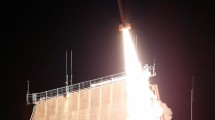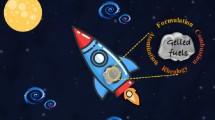Abstract
Shock tube facility in the Propulsion and High Enthalpy laboratory, Aerospace Engineering Department, has been extensively used to study the ignition characteristics of fuels by measuring the ignition delay times for various hydrocarbon fuels at high temperatures. Initially a systematic method has been followed to calibrate the shock tube for ignition delay time measurements by measuring the delay times of C2H6 – O2 gas mixture diluted with argon. The results show good agreement with earlier reported works of Ethane ignition. Ignition times of low molecular weight liquefied petroleum gas, a fuel used in many industrial and household applications has been studied in the temperature range of 1250–1880 K and in the pressure range of 6–11 atm at equivalence ratios (Φ = 0.5 & 1). The ignition delay was measured in the reflected shock region by recording the ignitioninduced pressure rise and emission from CH radical simultaneously. From the present study it is noted that the ignition delay time for liquefied petroleum gas reduces with increase in temperature and its activation energy lies in the range of 40 kcal/mol.
Similar content being viewed by others
References
Burcat, A., Scheller, K., Lifshitz, A. (1971) Shock–tube investigation of comparative ignition delay times for C1–C5 alkanes. Combust. Flame, v.16, pp.29–33.
Cooke, D.F., Williams, A. (1975) Shock tube studies of methane and ethane oxidation. Combust. Flame, v.24, pp.245–256.
Davidson, D.F. and Hanson, R.K. (2004) Interpreting shock tube ignition data. Internat. Jour. Chem. Kinet., v.36, pp.510–523.
De Vries, J., Hall, J.M., Simmons S.L., Rickard, M.J.A., Kalitan, D.M., Petersen, E.L. (2007) Ethane ignition and oxidation behind reflected shock waves. Combust. Flame, v.150, pp.137–150.
Gaydon, A.G. and Hurle, I.R. (1963) The shock tube in high temperature chemical physics, Chapman and Hall, London.
Hawthorn, R.D. and Nixon, A.C. (1966) Shock tube ignition delay studies of endothermic fuels. AIAA Jour., v.4, pp.513–520.
Held, T.J., Marchese, A.J., Dryer, F.L. (1997) A semi–empirical reaction mechanism for n–heptane oxidation and pyrolysis. Combust. Sci. Tech., v.123(1–6), pp.107–146.
Lam, K.Y., Hong, Z., Davidson, D.F., Hanson, R.K. (2011) Shock tube ignition delay time measurements in propane/O2/argon mixtures at near–constantvolume conditions. Proc. Combustion Inst., v.33, pp.251–258.
Lamoureux, N., Paillard, C.E. and Vaslier, V. (2002) Low hydrocarbon mixtures ignition delay times investigation behind reflected shock waves. Shock Waves, v.11, pp.309–322.
Li, S.C., Varatharajan, B., Williams, F.A. (2001) Chemistry of JP–10 ignition. AIAA Jour., v.39(12), pp.2351–2356.
Liang, J.H., Wang, S., Hu, H.H., Zhang, S.T., Fan, B.C., Cui, J.P. (2012) Shock tube study of kerosene ignition delay at high pressures. Sci. China–Phys. Mech. Astron., v.55, pp.947–954.
Lifshitz, A. (Ed.) (1981) Shock waves in chemistry. Marcell Dekker, New York.
Mathieu, O., Kapp, M.M., Petersen, E.L. (2013) Shock tube study of ignition of multi–component syngas mixture with & without ammonia impurities. Proc. Combust. Inst., v.34, pp.3211–3218.
Nagaboopathy, M. et al., (2008) Single–pulse chemical shock tube for ignition delay measurements. Curr. Sci., v.95, pp.1–10.
Olchansky, E. and Burcat, A. (2006) Decane oxidation in a shock tube. Internat. Jour. Chem. Kinet., v.38, pp.703–713.
Shin, K.S., Park, K., Kim, K. (2001) The addition effect of CH3Cl on methane ignition behind reflected shock waves. Bull. Korean Chem. Soc., v.22, pp.330–332.
Tishkoff, J.M., Drummond, J.P., Edwardsm T. (1997) Future direction of supersonic combustion research: Air Force/NASA workshop on supersonic combustion. In: 35th Aerospace Sciences Meeting and Exhibit. Reno, Nevada. AIAA Paper, AIAA–1997–1017.
Tsang, W. and Lifshitz, A. (1990) Shock tube techniques in chemical kinetics. Ann. Rev. Phys. Chem., v.41, pp.559–599.
Tschuikow Roux, E. (1965) Reaction dwell time and cooling rate in singlepulse shock tube. Phys. Fluids, v.8, pp.821–825.
Vasu, S.S., Davidson, D.F., Hanson, R.K. (2008) Jet fuel Ignition delay times: shock tube experiments over wide condition and surrogate model predictions. Combustion & Flame, v.152, pp.125–43.
Xiao–FeiNie, Ping Li, Chang–Hua Zhang, Wei Xie, Cong–Shan Li and Xiang–Yuan Li (2012) Shock tube study of n–decane ignition at low pressure. Acta Mechanica Sinica, v.28(1), pp.79–82.
Zhukov, V.P., Sechenov, V.A. and Yu, A. Starikovski (2003) Spontaneous Ignition of methane air mixtures in a wide range of pressure. Combustion, Explosion and Shock Waves, v.39(5), pp.487–495.
Author information
Authors and Affiliations
Corresponding author
Rights and permissions
About this article
Cite this article
Sundararaj, A.J., Pillai, B.C., K.R., G. et al. Investigation of Ignition Delay for Low Molecular Weight Hydrocarbon Fuel by Using Shock Tube in Reflected Shock Mode. J Geol Soc India 93, 218–222 (2019). https://doi.org/10.1007/s12594-019-1155-3
Received:
Accepted:
Published:
Issue Date:
DOI: https://doi.org/10.1007/s12594-019-1155-3




